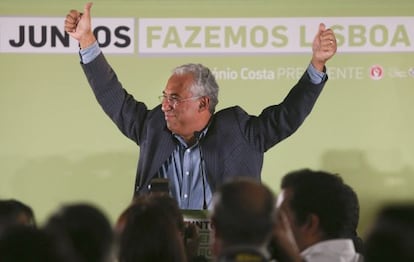Fed-up Portuguese punish ruling coalition with worst defeat in decades
Socialists take nearly half of mayoral races up for grabs in municipal elections

Angry about painful austerity measures imposed on their country under instructions from Brussels, Portuguese voters punished the center-right coalition government of Pedro Passos Coelho in Sunday's municipal elections by handing the ruling party its worst local election defeat in more than two decades.
With all the votes counted on Monday, the Socialists (PS) took 138 of the 308 mayoral races up for grabs, including obtaining a third term for Lisbon Mayor António Costa.
In Porto, the country's second-largest city, independent Rui Moreira trounced the ruling Social Democratic Party (PSD) candidate Luis Filipe Menenzes. "The defeat is mine; it is not the government's or the ruling party's," Menenzes said.
When there are many demands on government, there is always a price to pay"
Even though the results were positive for the Socialists, voter absenteeism was also the highest in decades, nearing 48 percent compared to 41 percent in the last municipal elections in 2009.
Prime Minister Passos Coelho late Sunday acknowledged that it was a bad defeat for the PSD. "During periods when there are many demands on government, there is always a price to be paid," he said.
The center-left PS garnered 36 percent of the national vote - eight points more than the last general elections - compared with just 17 percent for the PSD in races where its candidates stood alone rather than in an alliance with another party.
After more than two years of living with painful austerity, Portuguese have seen their standards of living drop sharply as the conservative government struggles to meet the terms of the 78-billion-euro bailout. Portugal has missed its deficit-reduction targets on two occasions and the Constitutional Court has blocked certain planned reforms in the public sector. Coincidently, the start of the election campaign began with a new inspection from the country's creditors: the International Monetary Fund (IMF) and the European Union.
In Lisbon, the victory for the charismatic Mayor António Costa is widely being seen in the Portuguese press as the final stepping stone for him to wrest the PS national leadership from António José Seguro, the current secretary general. Costas has not revealed what his political future will be, but some analysts on Monday speculated that he could easily mimic his victory in the next elections slated for 2015.
"Democracy is this: knowing how to win and lose. Tonight I called to congratulate Mr António Costa for his indisputable victory," said Fernando Seara, his opponent who represented the central government's ruling PSD/CDS-PP coalition.
In Porto, political divisions in the PSD led to the ushering in of an independent, while in Sintra - the country's third-largest city by population - the government's ruling coalition was kicked out of office by Socialist Basílio Horta, who won by just 2,000 votes.
Former Socialist Prime Minister José Sócrates said Sunday night that the results were "a disaster" for Passos Coehlo. But the results are not all positive for the Socialists either. In traditional stronghold municipalities of Grândola, Évora and Beja, the PS lost to candidates from the coalition of the Portuguese Communist Party and Greens (PCP- PEV)
The Lisbon daily Público reported on Saturday that Brussels is "now working" on a second bailout plan for Portugal. The prime minister has said in the past that he cannot halt his unpopular measures of tax hikes, pay and pension cuts and reductions in public services because the bailout creditors would stop handing over rescue funds.
Tu suscripción se está usando en otro dispositivo
¿Quieres añadir otro usuario a tu suscripción?
Si continúas leyendo en este dispositivo, no se podrá leer en el otro.
FlechaTu suscripción se está usando en otro dispositivo y solo puedes acceder a EL PAÍS desde un dispositivo a la vez.
Si quieres compartir tu cuenta, cambia tu suscripción a la modalidad Premium, así podrás añadir otro usuario. Cada uno accederá con su propia cuenta de email, lo que os permitirá personalizar vuestra experiencia en EL PAÍS.
¿Tienes una suscripción de empresa? Accede aquí para contratar más cuentas.
En el caso de no saber quién está usando tu cuenta, te recomendamos cambiar tu contraseña aquí.
Si decides continuar compartiendo tu cuenta, este mensaje se mostrará en tu dispositivo y en el de la otra persona que está usando tu cuenta de forma indefinida, afectando a tu experiencia de lectura. Puedes consultar aquí los términos y condiciones de la suscripción digital.








































